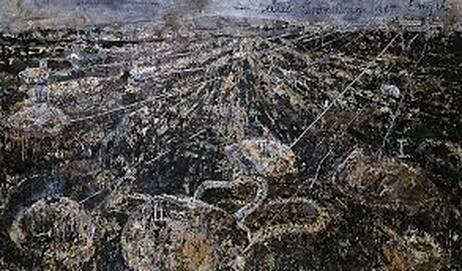|
THE FIELD
Jorie Graham On Anselm Kiefer, The Order of the Angels, 1983/84 1. Before, there is this field. And after, too, we are in the same field. Before, it is dark and we can’t speak yet see it: we stand in it: we feel our standing like a spindle, turning, twisting in its strange homesickness, strands of the looking out which leak flaxen, from us blinking in the dark, so quiet, gazelle of furling imaginings ―oh overgrown eye!―awaiting, in the gossamer of looking : some supple yet restraint clutter : suddenly multi-faceted, edges emerging : one big one at the top, horizontal, like an ending : crepe-like (incomparably soft) the sides: like wings : yes, in the field of the periphery (head still― eyes forward―) : the sides (just beyond actual seeing), the sides fetched-up with coarse spectrums, outskirts of the betrothal: almost a sensation of regret, as where a voice, still calling-out does enter finally the inaudible : and you know they can’t see you anymore so why are you : still standing her: why: why?: unless of course you turn your head: there now: efficient: (why the sound in the inaudible like a cough? or a spade stabbing soil? a wedge of snow falling of itself onto the snow): there now, you can begin again: again: the eyes starting the story afresh, bits connected, the whole philosophical vertigo molting your glaces―(more and more of them)―off its spoked long-distanced, stringy, muddy (with what?) debris―a delirium―furrowed―mudtroughs, mudripplings everywhere― equality the terror―equality of all seen things―gaze like a fabric dropped hissing through the open and then down, like a stillness, onto: 2. So, now, we are in this field and it is the start of day. It is deep with what appears to be mud. Actually what has opened the soil and made it exuberant, made it snarl with suctions and tiny, momentary, frontiers, is blood. Enough blood to cough up the underloam ―and footsteps, and the weight of many bodies, heavy equipment (grammatical swirlings of tire-tread, tank-tread― if there were horses one cannot tell) . . . It looks, of course, Now that the bodies have been taken away Each to its own luminous personality―name and number― and now that what can be salvaged of the mutations has been, each to its own purpose, washed-clean, re- built― it looks (if only the sun would come out) like any field in which the work of humans has distended itself―site, set, field of visions―there is a bit of cyclone fence (barbed wire?) which the mud has, unswirling, taken into itself, you can see where its ribs are each now erased in newly-ribbed mud, you can see where the mud is joying a pattern, you can see where six large boulders are holding down the bureaucracy of mud, where its power must, swirling, reassign themselves, slipping upwards in yieldings that become aggressions, up- thrustings enhancements, furrows and furrows of matter being made to re-place itself. A new place. Yet remember the wetness in it, how it will shape the dirt into waves. Remember the liquidity spiraling up in this heavy mediation and then, as the sun returns (when the sun will return) how it will harden into the shape of how free it had been Remember though what imbues it. Not red―the soil has taken the color. Not simply viscous― this soil is full of clay to begin with . . . And remember, too, how all bodies, all the sources of the wavelike frothings of this quickened soil have been lifted one by one and claimed and cleaned. 2a. So much blood the whole field was opened by it. And still is open after this time. Remember that the bodies (and machines) were recovered Place them on the field again (27,000), spread out their limbs, rip their garments, a sleeve, a shoulder―let them catch light― (so you can see)―then lift them away, one by one, up out of the mud― then come back with the others to get the machines―clear them out―there, you have it now: the field 3. Today I am gazing at it in this book. I look up suddenly, now, a man runs across my yard screaming Roger, Roger―hoarse, large with rage―his black dog leaping Wildly ahead of him, staying so. 4. In the air of this room, in what slavers under this layer of listening, I can hear, through the speakers, fingers on the piano keys― then a pushing (a sound beneath) a susurration of busy desire (or fear?) ―not a clicking (as of fingernails)―but the pressure in the making of the thing Made―the making of the note distinct from the intended note―distinct from the imagined note. Just where it pushes free, where the hands go into the machine to want to find and then to find. 5. Outside, smoke rises between the houses. I look carefully. Nobody there. |
|
